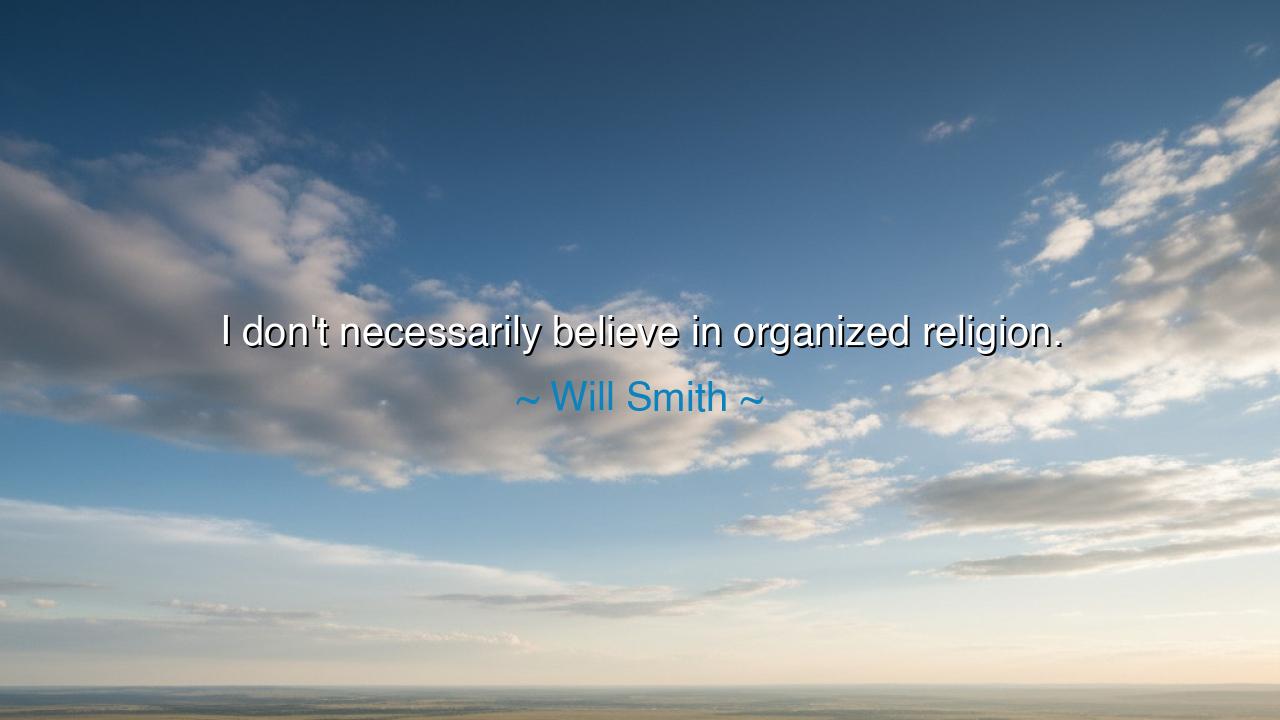
I don't necessarily believe in organized religion.






Throughout the long history of humankind, spirituality and faith have shaped the essence of many lives. They have been a source of comfort, meaning, and guidance, but also a cause of division, conflict, and dogma. Will Smith’s words, "I don't necessarily believe in organized religion," strike at the heart of a question that has been asked by many throughout the ages: can the human spirit find fulfillment in spirituality without being confined to the rigid structures of organized faith? His statement is a call to examine the relationship between individual belief and the institutions that seek to guide that belief. It suggests that faith, in its purest form, may transcend the boundaries of structured religions and instead be a deeply personal and individual experience.
In the time of the ancients, organized religion played a dominant role in shaping the spiritual lives of individuals, yet even then, there were many who questioned its influence. Socrates, the great philosopher of Athens, was famously skeptical of the religious practices of his day. Though he respected the gods, he did not adhere to the traditional religious rituals that were prescribed by the state. Instead, he pursued personal wisdom and spiritual understanding through dialogue, reflection, and reasoning. His famous statement, "The unexamined life is not worth living," speaks to the belief that true spirituality comes not from blind obedience to religious structures, but from self-examination and personal connection to the divine. Socrates’ quest for truth and meaning was one of profound individual spirituality, disconnected from the formalities of organized religion.
Similarly, the Roman Empire was a land of diverse religious practices. Despite the state-sponsored cults and the imperial cult, which promoted the worship of emperors as gods, many Romans followed more personal spiritual paths. Stoicism, a philosophy founded by Zeno of Citium, was especially popular among the educated elite, offering a form of spirituality grounded in reason, virtue, and an understanding of the natural world. Marcus Aurelius, one of Rome’s greatest emperors and a Stoic philosopher, expressed in his Meditations that true spiritual peace comes from aligning oneself with nature and accepting the impermanence of life. His views were not aligned with the worship of gods through rituals but instead focused on the cultivation of personal wisdom and self-discipline.
The rise of Christianity in the Roman Empire marked the beginning of a more formalized structure of organized religion. Saint Paul, one of the religion's early leaders, spread Christianity across the empire and advocated for a universal faith that transcended cultural boundaries. Despite this, early Christians did not always agree on how organized their faith should be. The Reformation in the 16th century, led by Martin Luther, was a dramatic rejection of the Catholic Church’s authoritarian structure and its emphasis on ritual and indulgence. Luther argued that individuals should have a direct relationship with God, independent of the hierarchical clergy. His challenge to organized religion ignited a broader conversation about the need for personal spirituality over institutionalized practice.
In the modern world, Will Smith's skepticism toward organized religion resonates with many who feel that spiritual connection should be a personal matter, not dictated by external authorities. Today, many people embrace what is often called a "spiritual but not religious" approach. These individuals seek a deeper connection to the divine through nature, personal meditation, or philosophical exploration, rather than through the rituals of organized faith. Smith's statement reflects the broader cultural shift toward individuality in matters of spirituality—a desire to find meaning outside the confines of traditional religious institutions.
However, it is important to recognize that organized religion has provided structure, support, and a sense of community for countless people throughout history. The communal aspect of religion—coming together for worship, celebrating life’s milestones, and offering support during times of grief—cannot be underestimated. Many find deep solace in the rituals and doctrines of established faiths, and these structures continue to shape the moral frameworks and social norms of societies worldwide. Religion, when practiced with sincerity and humility, can be a great force for good, fostering compassion, justice, and community.
The lesson to be drawn from Will Smith’s words is one of personal autonomy in matters of faith and spirituality. While organized religion may offer structure, comfort, and a sense of belonging, it is the individual’s personal journey—one of self-discovery, reflection, and connection to the divine—that forms the true foundation of spiritual life. Whether one finds meaning through organized faith, philosophy, or personal practice, the quest for truth and meaning is a deeply personal one. We must each cultivate our own spiritual path, embracing the wisdom of the ancients and the lessons of history, while honoring our own journey toward self-understanding and divine connection.
In our own lives, let us seek to honor both the individual and the collective dimensions of spirituality. Let us reflect on the role of organized religion in our communities and in our hearts, while also carving out space for personal exploration and self-reflection. Faith is not a one-size-fits-all journey; it is a deeply personal and evolving process that requires us to remain open, curious, and willing to challenge the structures that no longer serve us. Let us walk our path with integrity, honesty, and an unwavering commitment to finding truth—whether within the walls of a church, in the quiet moments of meditation, or through our connections with others. By doing so, we will find a spirituality that is as unique as our own hearts, guiding us toward a life of meaning and purpose.






AAdministratorAdministrator
Welcome, honored guests. Please leave a comment, we will respond soon